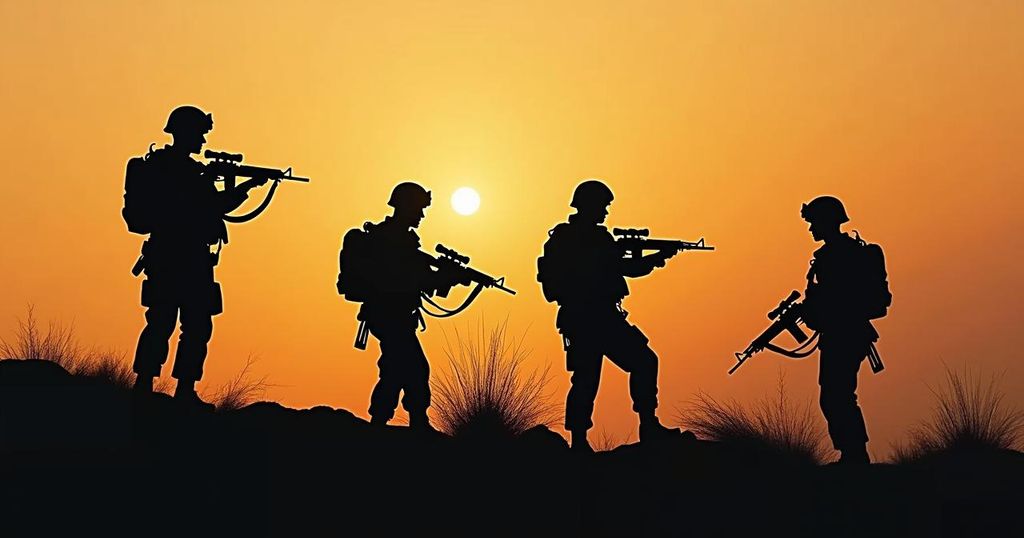Iraq’s Strategic Neutrality Amidst Regional Conflict Escalation
Iraqi forces, in light of growing regional conflicts involving Israel and Iranian interests, have determined to remain neutral and avoid direct involvement in military action while focusing on humanitarian aid for civilians. Prime Minister Mohammed Shia al-Sudani has engaged with political and military leaders to explain the potential repercussions of Iraq’s involvement in these conflicts, emphasizing the need for stability in Iraq amidst escalating tensions.
In a strategic decision to maintain stability, Iraqi forces affiliated with Iran have opted to keep their distance from the escalating conflicts involving Israel, Hezbollah, and Iran. This decision arises from concerns regarding potential repercussions that further conflicts could impose on Iraq’s delicate political and economic landscape. According to statements from Iraqi officials and leaders of Iranian-backed factions, the current focus is redirected towards humanitarian assistance for civilians impacted by Israel’s ongoing military actions in Lebanon. Commanders have also indicated that no U.S. interests in Iraq or military bases in Iraq and Syria will face targeting by Iraqi armed groups for the time being. The regional escalation, marked by retaliatory strikes between Israel and various factions including Hezbollah and Iranian interests, has led to fears of wider conflict spilling over into Iraq. While Israel has engaged in military operations against Lebanon and has reportedly carried out assassinations linked to Iranian leadership, Iraq’s Prime Minister Mohammed Shia al-Sudani has been proactive in addressing these issues through numerous discussions with political and military leaders. He has sought to illustrate the potential consequences of Iraqi entanglement in the conflict, emphasizing the fragility of Iraq’s situation. As Iraq grapples with heightened tensions, notable precautions have been taken, including heightened military readiness and clear directives dissuading engagement in the regional conflict. The Popular Mobilisation Forces (PMF), which oversees various Iranian-affiliated paramilitary groups, has convened to discuss the risks and to ensure that their registered fighters do not partake in the ongoing hostilities. Moreover, should Israel choose to strike Iraq, a coordinated response from Iraqi paramilitary elements can be anticipated, albeit in a defensive posture intending to avoid direct confrontation at this stage. Overall, the anticipated engagements suggest a cautious approach from Iraqi forces, aiming not to provoke an Israeli response while also balancing the immense domestic turmoil caused by the conflicts in the region.
The Middle Eastern region is currently facing escalating tensions involving Israel, Hezbollah, and Iranian interests, leading to complex geopolitical considerations for neighboring states such as Iraq. The recent military engagements by Israel in Lebanon have ignited fears of a wider conflict, with Iraqi factions contemplating their roles in such confrontations. Historical alliances and retaliatory assaults between Israel and Iranian-backed militias underline the precarious balance that Iraq must maintain, as direct involvement could jeopardize its already strained political and economic stability.
In summary, Iraqi forces are consciously distancing themselves from the escalating conflicts involving Israel, Hezbollah, and Iran to preserve Iraq’s fragile stability. Iraqi Prime Minister Mohammed Shia al-Sudani’s diplomatic efforts and the operational directives of Iraqi armed factions reflect a calculated decision-making process aimed at avoiding a regional conflagration while managing internal security concerns. The situation remains volatile, with a careful balance between non-involvement and the potential for retaliation should Iraq be targeted by escalating Israeli military actions. Ultimately, the current strategy emphasizes humanitarian support for affected civilians while maintaining a vigilant posture against possible Israeli strikes, showcasing the complexities of regional geopolitics in a time of heightened conflict.
Original Source: www.middleeasteye.net




Post Comment